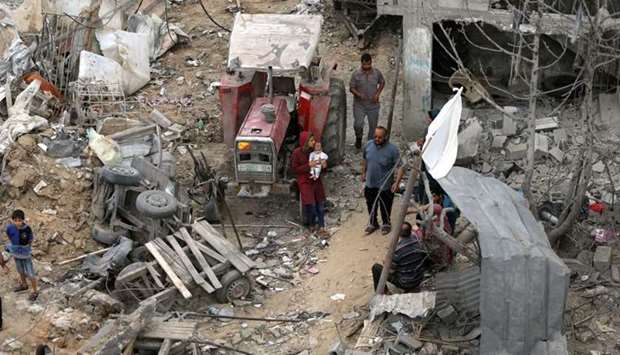* Rockets and air strikes cease in Egypt-mediated deal
* Biden promises aid, UN urges dialogue
* Civilians relieved, but wary
A truce between Israel and Palestine took hold on Friday after the worst violence in years, with US President Joe Biden pledging to salvage the devastated Gaza Strip and the United Nations urging renewed Israeli-Palestinian dialogue.
Israel's bombardment of Gaza and rocket attacks on Israeli towns ceased after 11 days under an agreement mediated by Egypt, but with negotiations to maintain stability still to be held, it was unclear how long it would last.
Five more bodies were pulled from the rubble in the densely populated Palestinian enclave, taking the death toll to 243, including 66 children, with more than 1,900 wounded and critical infrastructure damaged as well as thousands of homes.
In Israel, the military said a soldier had been killed as well as 12 civilians; hundreds have been treated for injuries in rocket salvoes that caused panic and sent people rushing into shelters as far away as Tel Aviv.
Palestinians who had huddled in fear of Israeli shelling poured into Gaza's streets, embracing one another in celebration in front of bombed-out buildings.
Mosque loudspeakers feted "the victory of the resistance achieved over the Occupation (Israel)." Cars driving around East Jerusalem’s Sheikh Jarrah at dawn flew Palestinian flags and honked horns, echoing the scenes in Gaza.
In the countdown to the 2am (2300 GMT Thursday) cease-fire, Palestinian rocket salvoes continued and Israel carried out at least one air strike.
Egypt said it would send two delegations to monitor it as the warring parties said they were ready to retaliate for any violations.
Civilians on both sides of the front line were sceptical.
"I don't agree to (truce). What is truce? What does it mean?" said Samira Abdallah Naseer, a mother of 11 children sitting near the wreckage of a building near Beit Hanoun in the north of the Gaza Strip.
"We returned to our houses, and we found no place to sit, no water, no electricity, no mattresses, nothing," she said.
In a cafe in the Israeli port city of Ashdod, north of Gaza,
The violence erupted on May 10, triggered by Palestinians' anger at what they saw as Israeli curbs on their rights in Jerusalem, including during police confrontations with protesters at Al-Aqsa mosque during the Ramadan fasting month.
Hamas cast the fighting as successful resistance to a militarily and economically stronger foe.
"It is true the battle ends today but Netanyahu and the whole world should know that our hands are on the trigger and we will continue to grow the capabilities of this resistance," said Ezzat El-Reshiq, a senior member of the Hamas political bureau.
El-Reshiq told Reuters in Doha the movement's demands included protecting the Al-Aqsa mosque in Jerusalem and stopping Palestinians being evicted from their homes in East Jerusalem.
Saleh Diab, who was among those threatened with eviction, was relieved but wary. "This is a morning of freedom, a morning of victory," he said, adding that hoped now to remain in his home but feared what Israel would do next.
Amid growing global alarm, Biden had urged Netanyahu to seek de-escalation, while Egypt, Qatar and the United Nations sought to mediate. The truce appeared to be part of a two-stage deal.
In a televised address on Thursday, Biden extended condolences to bereaved Israelis and Palestinians and said Washington would work with the United Nations "and other international stakeholders to provide rapid humanitarian assistance" for Gaza and its reconstruction.
After days of Israeli air strikes that destroyed residential towers and damaged electricity lines, Gaza officials said 16,800 homes were damaged and residents were getting three or four hours of power compared with 12 hours before the fighting.
Palestinian officials put the cost of Gaza reconstruction in the tens of millions of dollars, while economists said the fighting could curb Israel's economic recovery from the Covid-19 pandemic.

Palestinians return to their houses which were destroyed by Israeli strikes in the recent cross-border violence between Palestine and Israel, following Israel-Hamas truce, in Gaza
